5 things you need to know about the rise and fall of Digg.com (#5 will shock you!)

Digg.com, a very successful social platform that disrupted the news industry, completely redesigned its website in August 2010. You won't believe what happened next! (hint: it went wrong!)
Clickbaiting headline: the only reason why you’re reading this post
What is Digg?
Digg was launched in 2004 as a link aggregator website. The platform enabled users to share web links and vote those links up (digg) or down (bury). The most up-voted links then showed up on the front page of the website. Essentially, Digg was supposed to replace traditional newspapers by creating a “front page” of the internet.
Digg.com front page in 2008 (looks oddly familiar to Reddit.com today…)
Digg’s success
In 2006, Kevin Rose, one of Digg’s co-founder, was featured on the cover of BusinessWeek with the headline: “How this kid made $60 million in 18 months”. At that time, the website was attracting close to 200 million unique visitors per year and was raising large amounts of capital from investors(1).
Kevin Rose, co-founder of Digg. Thumbs up before imminent failure!
Digg’s failure
In August 2010, Digg released a new version of the website code-named “Digg v4”. Shortly after, the number of visitors dropped by more than 50%(2), 40% of the staff was laid off (3) and Kevin Rose resigned (4).
RIP Digg.com 🙂
5 digital challenges that Digg couldn’t handle
So what exactly happened? Well, it turns out that digital challenges affect all businesses, not only traditional ones. Here are 5 digital challenges that Digg failed to address and what they should have done.
- Users were abusing Digg’s digital platform
Even though Digg concept was initially very democratic (everybody could submit links and everybody could vote), it quickly became an oligarchy. The reason was the so called “power users”: a select group of users who had disproportionate influence on votes because they were “popular”. Every time a power user would submit a link to Digg, all its followers would up-vote the link. As a result, more than 50% of the front page was filled with power-user submitted links (6). Not very democratic!
Only 44% of Digg’s frontpage was posted by non-power-users in December 2009
→ Solution:
As always with digital platforms, people try to rig the system every time you give them a chance. A solution could have been to mimic 4chan.org’s anonymous posting policy in order to reduce influence of individual users (7). When posting is anonymous, users are not incentivized to abuse the system for self-promotion or fame.
- Digg dug its own grave by changing its user interface
Digg v4 (released in 2010) removed widely popular features from the website, of which the ability to bury (downvote) posts, to save favorites, to sort by subcategories, to post videos, and to search history. These changes were implemented by the management team with no regards to user feedback or preferences. It resulted in a massive loss of visitors.
→ Solution:
In a digital world, the user interface (UI) is key. Digg made radical changes to its UI and lost half of its userbase overnight, even though its core offering didn’t really change. They should have beta-tested this new UI and actually listened to the feedback of early adopters who had voiced concerns before the deployment of v4 (8).
- Digg yielded to investor pressure
“… this new version of Digg reeks of VC meddling. It’s cobbling together features from more popular sites and departing from the core of digg, which was to ‘give the power back to the people.’” – Alexis Ohanian, co-founder of Reddit (competitor of Digg)
One of the reasons behind Digg’s v4 fiasco were the VC investors who put pressure on Digg to generate profits (9). As a consequence, Digg tried to copy other more popular (and profitable) websites instead of sticking to its existing features. In addition, Digg changed its ranking algorithm in v4, and pushed “corporate sponsored” articles to its frontpage:
Over the few days that followed v4 launch in 2010, 56% of the frontpage was dominated by 6 corporate websites
→ Solution:
Generating profit as a digital platform is hard. Taking shortcuts to get there is a losing strategy! Digg should have focused on its users rather than on its P&L. Reddit did it and is now #1 (and worth millions even though they’re still losing money).
- Reddit copied Digg and got away with it
Reddit was founded in 2005 and offered almost the exact same features as Digg. Contrary to Digg, however, they never changed their UI and were comfortable in losing money because they were acquired by Condé Nast Publications, who provided ample financial safety. When Digg v4 was released, Reddit welcomed Digg users (and even put a Digg logo on their website to taunt them!)
Reddit’s frontpage. Looks exactly like Digg, yep.
The great “Digg Exodus” when Digg users switched to Reddit
→ Solution:
Digital platforms are very competitive by nature: any new entrant can replicate your website overnight. What it can’t replicate is the user base and the community, and this is what Digg should have protected above all (instead of changing the UI to make it mainstream).
- There’s no 5 [SHOCKER!] – Digg failed because Digg failed
In social platforms, there is a part of luck and timing that you just cannot control. Maybe Digg’s community was not meant to last because it was too “niche”. In the end, no one can predict if a social website is going to be successful or if it’s going to fail: Facebook popularity was a surprise to Zuckerberg, MySpace disappeared for no obvious reason, Twitter was originally meant to be a SMS service, 4chan was supposed to just be an image board…
Sources
- https://siteanalytics.compete.com/digg.com/?metric=uv
- http://mashable.com/2010/09/24/digg-traffic-stats/#3gt4K1v8akqM
- https://techcrunch.com/2010/10/25/digg-to-lay-off-37-percentof-staff/
- http://mashable.com/2011/03/18/kevin-rose-resigns-from-digg-report/?utm_source=feedburner&utm_medium=feed&utm_campaign=Feed%3A+Mashable+%28Mashable%29#3gt4K1v8akqM
- https://gigaom.com/2010/08/26/digg-redesign-met-with-a-thumbs-down/
- https://medium.com/social-news/the-death-of-digg-still-lingers-for-former-power-users-aa584de7770#.vu1ns8n8b*
- https://www.ted.com/talks/christopher_m00t_poole_the_case_for_anonymity_online
- http://venturebeat.com/2010/08/30/diggs-top-user-warned-of-possible-backlash-months-ago/
- http://www.alwaysbeupgrading.com/diggs-downfall/
(788 words)



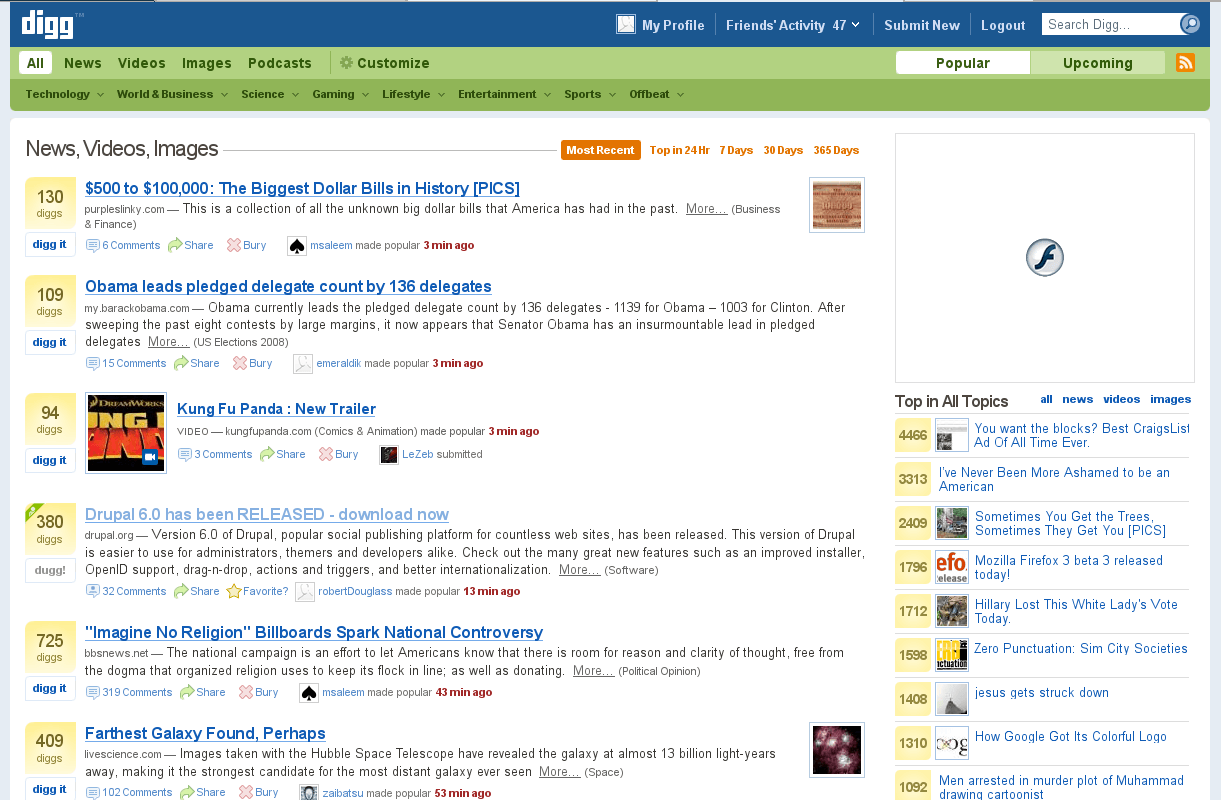

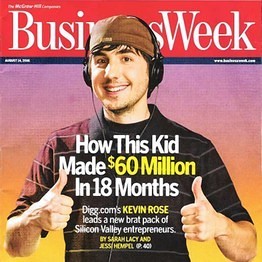
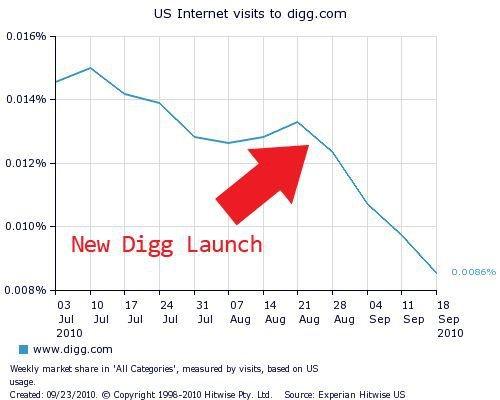
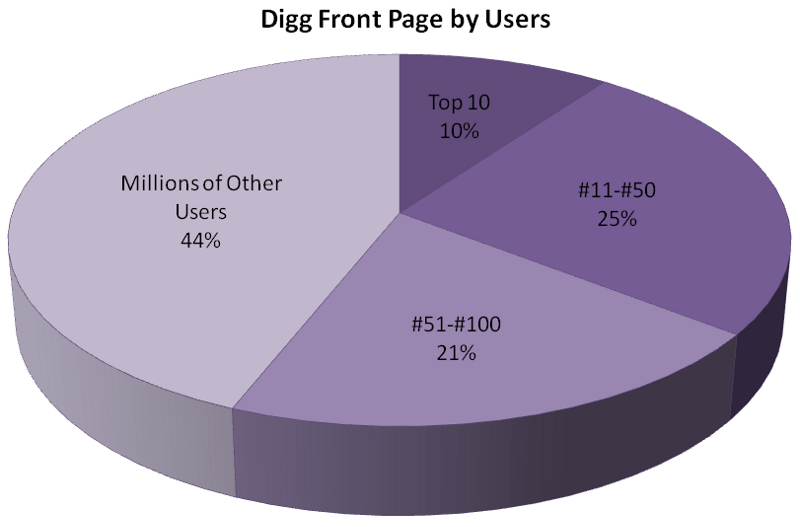
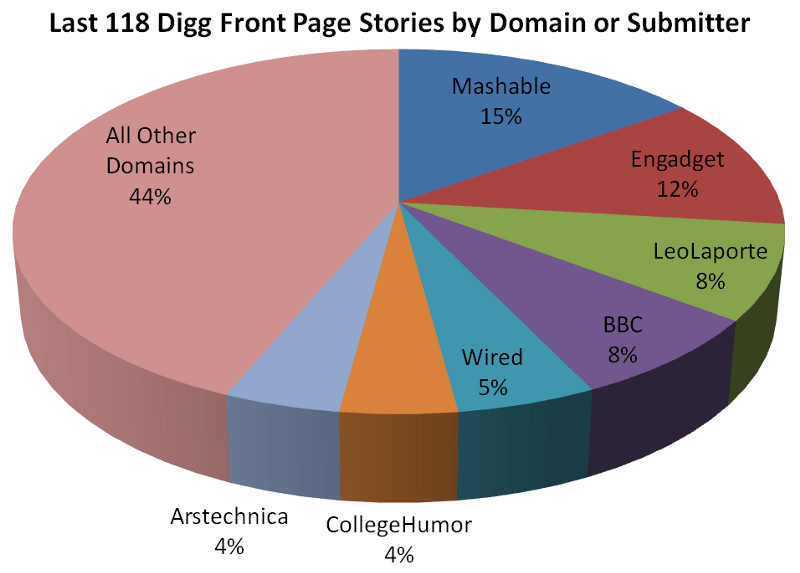

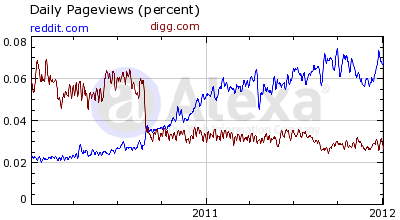
Very interesting article, Raphael. I agree with most of your points, but one thing I was left wondering is whether changing Digg’s interface was in fact completely wrong. I agree that they should have listened to user feedback, but Facebook has been able to get away with this in the past. How many times has Facebook changed its features (cover page, news feed, layout, etc..) and we get angry at first, but then get used to it? It tends to be easier for us to evaluate an action after the fact, but I wonder on what the right approach would be change and disrupt interfaces without actually losing users. I agree with you that there might not be a secret or one definite answer, but it is worth thinking about.
Very true Daniela. Did Facebook ever remove features though? I feel like every Facebook update adds features vs. the previous one, which makes it more acceptable to users. And since it’s hard to predict the consequences of a radical change in interface, maybe the solution is to never radically change the interface (see Craigslit or Reddit, who both have never changed interface and are still successful despite a 90’s look!)
I wonder if stickiness is a factor for Facebook’s ability to irritate users with changes without hurting its membership too. While users on Digg or Reddit can create relatively substantial online libraries of past submitted content, comments, and saved/liked posts, their presence on a site like Digg or Reddit is still less of an investment than one’s presence on Facebook. Because leaving and recreating a meaningful presence on another site is difficult, I have to imagine that Facebook users are more willing to put up with Facebook’s changes without fleeing. Admittedly, this same argument is effectively undone by the massive exodus of Myspace users to Facebook a few years ago, but as you pointed out in your post the social patters on these online communities are fickle and often unpredictable. Now if we could only figure out how to use digg’s failure to convince major news sources like CNN and Forbes to stop using clickbait structures on their websites….
Fair point Alex, but while your presence on Digg/Reddit is less an investment than your presence on Facebook, you can still see some stickiness on the users side due to the “community” aspect. For example, there are a lot of Reddit clones today (9gag, iFunny, Voat.co), but Reddit users still stick to Reddit because the “community” is allegedly better. I think a key challenge in the digital world is your ability to create a sustainable community, regardless of your design/UI/Product offering.
Interesting read! My overarching question is, even had Digg retained its users, would it really be any less of a failure? Call me old fashioned, but I see generating revenue and *gasp* profits as the true measures of success (unless I’m undervaluing the true societal benefit of Digg and Reddit). It just seems like VCs invested in these websites (Digg, Reddit, etc.) believing they could somehow monetize the strength of their communities only to find out that Internet users are fickle beasts (we all owe Ellen Pao an apology). Do you believe that any of these sites will one day be truly lucrative or are they all part of the fintech froth and Digg’s bubble just burst quicker?
Thanks for the article, Raphael. As I was reading it, I tried to put myself in the shoes of the Digg CEO and why he attempted to push such radical transformation (shameless LEAD plug on my part). While I agree with your assessments of why he failed, I ask you, if you were the CEO, what would have been keeping you up at night? I think the likes of Reddit, Buzzfeed, etc. have piled into the space making the content a commodity, which affects their ability to attract advertising on their websites, the core of their business model. In what other ways might they have engaged their community members without sacrificing the UI their users had grown to love?
Raphael, you are the only HBS student who could mention 4chan twice in a submission for class. I’m impressed. I’m also with Emma on that I think there are a lot of these internet companies that will never be profitable. You mentioned reddit, for example. According to this article, reddit benefited greatly from Digg’s attempt at monetization (http://www.forbes.com/sites/insertcoin/2015/07/04/allergic-to-change-and-profit-reddit-risks-eating-itself/#50958df51720). Furthermore, from then on, everytime reddit has tried to pull levers to monetize their 7 billion page views a month, the community has kicked and screamed and threatened to leave. Although I much prefer reddit to buzzfeed, as an investor, I would take buzzfeed over reddit. Buzzfeed users don’t seem to mind the blatant monetization. I’m not sure that when you acquire communities like these, you will ever be able to monetize it if you did not make your userbase accustomed to that from the start.
Thanks Alan! 4chan is a good example of how diverse online communities are and what they can become (good and bad) when you let users have free reign over the content submitted. As I mentioned in my #1 point, one of the key challenges of digital platforms is that the users will try to abuse the system, and 4chan is a good example of that.
Regarding the investment side, I agree that it is still hard to see how money will be generated from these websites. But then again, everybody said the same about Facebook during the IPO, and the stock is much higher now than it was before!